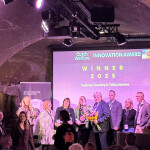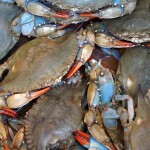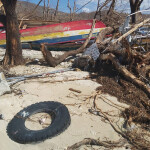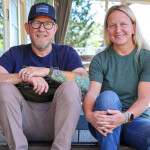Filters
Product Categories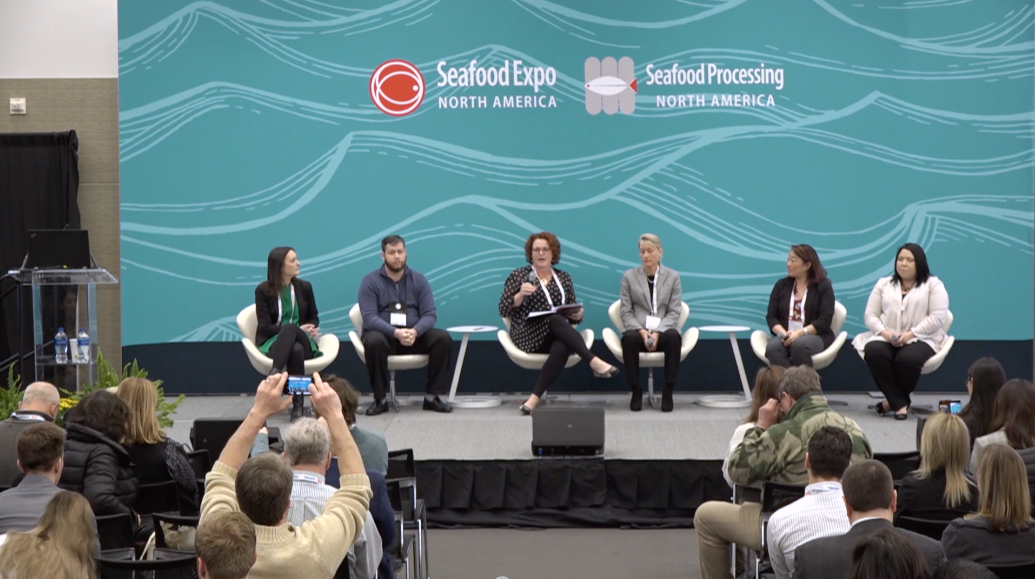
Speakers: Christine Burns Rudalevige, Coastal Culinary Academy; Abbie Curtis O’Reilly, GlobeScan; Brandon Hill, Sustainable Restaurant Group; Jennifer Lambert, Loblaw Companies Ltd.; Jan Tharp, Bumble Bee Seafoods; Shelley Zang, Kroger
A recent consumer survey found that 79 percent of American seafood consumers agree that fish must be protected for future generations. However, only 15 percent of American seafood consumers feel that retailers and large companies are effectively protecting the ocean environment. How can this gap be bridged? This session will attempt to better understand consumer behavior and the roles that brands, retailers, distributors, restaurants, and NGOs play in this important space. It will also unpack consumer decision-making at point of purchase, and the role the Marine Stewardship Council plays in purchase motivators. The panel will open with an overview of the survey results by Globescan, followed by input from industry leaders on how they are engaging with consumers and making them feel more confident in their purchases. Time will be dedicated to engaging the audience in a discussion about how to empower consumers in their purchasing decisions. The goal of this session is to gain an understanding of consumer purchasing motivators and market trends so that seafood brands, retailers, etc., can better inform their sustainability practices.
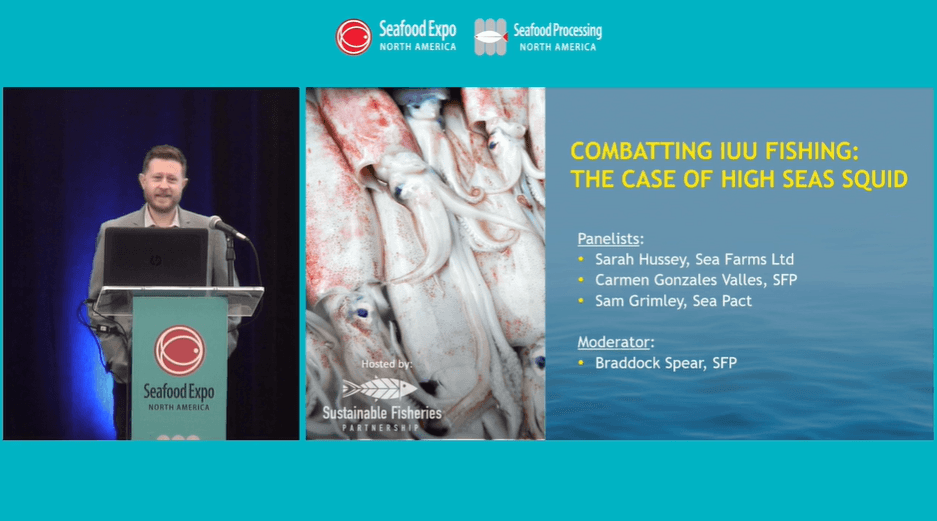
Moderator: Braddock Spear, SFP
Speakers: Sam Grimley, Sea Pact
Sarah Hussey, SeaFarms LTD
To combat each of the components of IUU fishing (illegal, unreported, and unregulated), different actions and multiple players are required. Governments need adopt laws, adhere to international agreements, set regulations, and enforce. Companies trading in seafood need to maintain ethical standards, support government actions to combat IUU, conduct due diligence of sources and suppliers, and impose consequences in response to illegal or unreported fishing activity. The high seas squid fisheries in the waters off the coast of South America presents a case study where governments and seafood companies are taking steps to stop IUU fishing. Our panel will provide three different industry perspectives on these issues in the fisheries and actions that have been, are being, and can be taken.
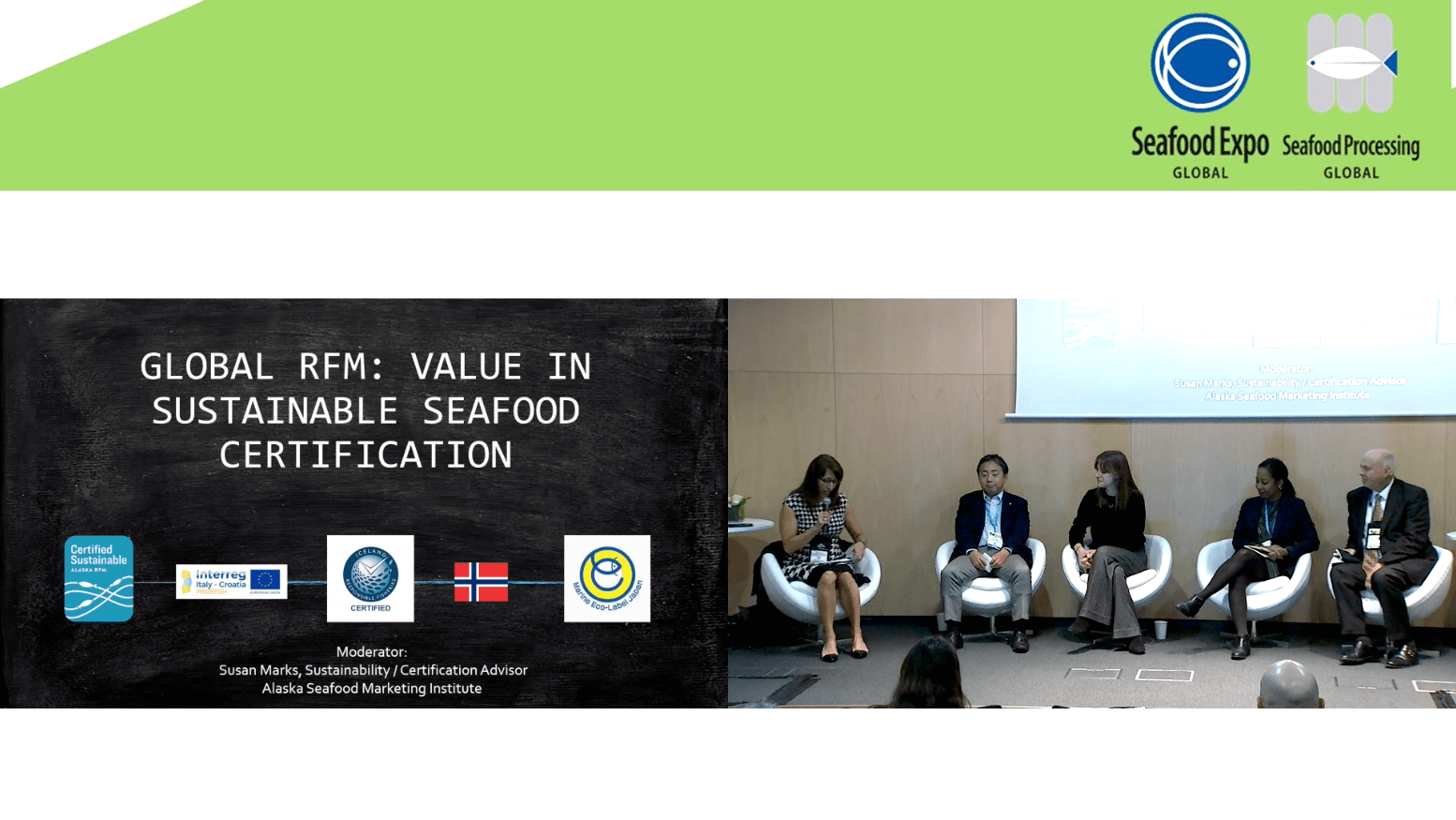
Speakers: Sévrine Bethy, Food Safety and Responsible Sourcing Manager - Group Supply Management - SODEXO, Hisa Kanno, Secretary General / Technical Manager - Marine Eco-Label Japan Council, Allen Kimball, International Fisheries Operations and Sales Consulting - Trident Seafoods, Giulia Sandalli, Postdoctoral research fellow - Institute for Marine Biological Resources and Biotechnology of the National Research Council (CNR-IRBIM), Sigrid Merino Sardá, Managing Director - Iceland Responsible Fisheries Foundation
The Responsible Fisheries Management (RFM) certification programs offer a way for markets to provide certified, sustainable seafood and highlight the origin without the added expense of logo-licensing fees. Research shows that origin is often a key motivator for seafood purchases and consumers continue to demand more transparency in knowing where their food comes from. (Datassentials; Edelman Trust Barometer 2021) Many certification programs do not include origin on their logos leaving consumers in the dark about where their sustainable seafood comes from. Our goal is to make certified sustainable and traceable wild-caught seafood accessible to all. RFM based programs in Alaska, Iceland, The Gulf States, and Japan have gained momentum in the last few years, with all four achieving recognition to the Global Sustainable Seafood Initiative (GSSI) global benchmark. These programs are accredited and rooted in the Food and Agriculture Organization (FAO) Code of Conduct for Responsible Fisheries and provide a way for well-managed fisheries to be recognized as sustainable. For the supply chain, RFM programs provide a credible and affordable certification choice for customers who want to:
• Demonstrate proof of sustainable seafood sourcing;
• Highlight the origin of their certified sustainable seafood via an ecolabel that is free to use;
• Lessen the cost burden for all participants in the supply chain.
This panel will discuss how the various RFM Programs in North America, Iceland, and Japan are working together towards a future vision for a global RFM program that will eventually represent 6,000,000+ metric tons of certified, sustainable wild-caught seafood and why this appeals to other countries that are interested in offering RFM certification for their fisheries.
We will hear from fisheries in the European Union who are currently considering development of their own RFM program and why they have decided now is the time to explore alternative certification programs. You will learn about the shared Chain of Custody Standard between Alaska and Iceland and how this model is serving as a blueprint for future collaborations between RFM programs that will benefit the marketplace. We will also hear from industry how using the RFM Program adds value and saves money. Finally, we will discuss the difference between the RFM model of certification and other programs that charge a fee to gain market access. How can these programs exist and not charge logo-licensing fees? It is possible and is the foundation these programs are committed to upholding.
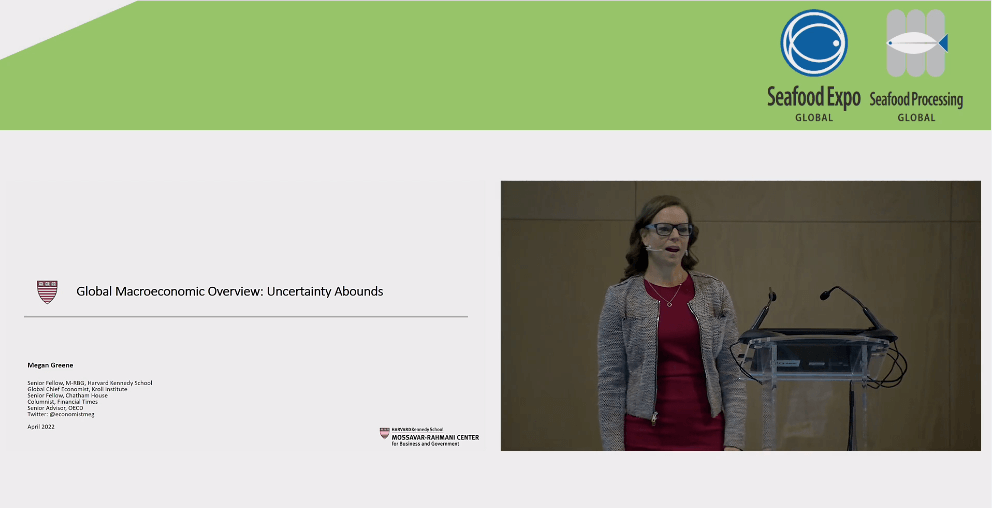
Speaker: Megan Greene, Harvard Kennedy School
Economic forecasting is a tricky business; they say the key to success is to forecast often. Megan Greene is unafraid to have out of consensus views and has a fantastic forecasting track record. She examines high frequency economic data, structural trends, global flows, political factors and policy developments to determine the state of the global recovery and to highlight risks and opportunities for businesses and markets. In this keynote presentation, Greene will examine these factors to offer insight on where the global recovery is heading, including an outlook for international supply chain challenges, inflation, and climate change.
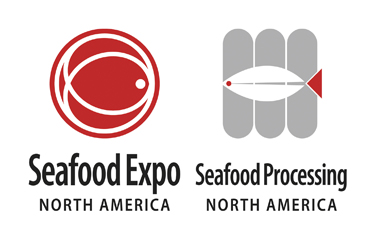
Access all available Seafood Expo North America 2024 conference session videos.

Worker Voice in the US And Beyond: Strategies for Change in the Seafood Industry

BLOCKCHAIN IN THE SEAFOOD INDUSTRY: Increasing transparency and efficiency in supply chains
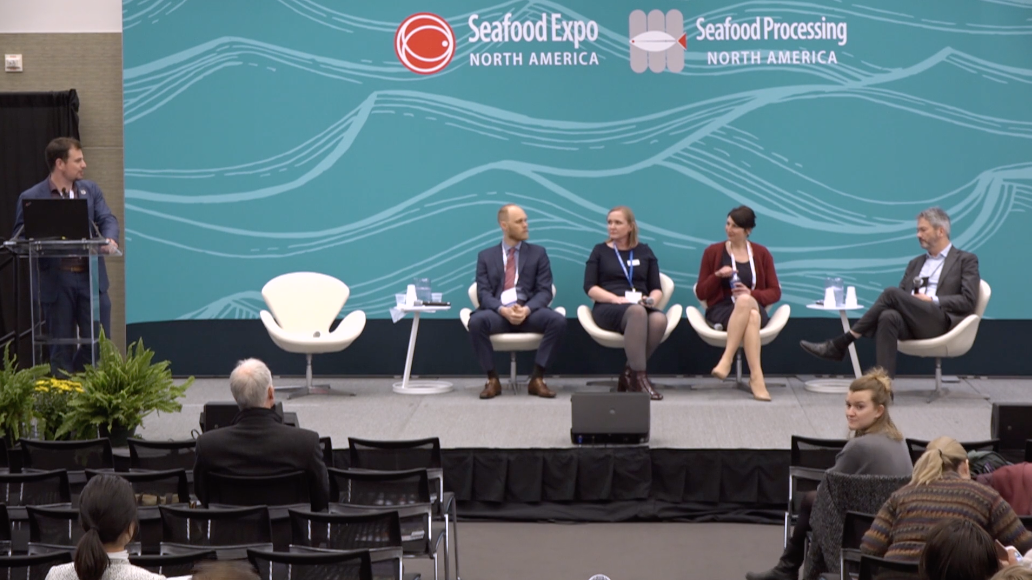
Speakers: Herman Wisse, The Global Sustainable Seafood Initiative (GSSI); Darian McBain, Thai Union; Hugo Byrnes, Ahold Delhaize; Sonja Schmid, The Consumer Goods Forum; Joe Zelasney, Food And Agriculture Organization
Globally, great efforts have been made to ensure seafood is produced and traded in an environmentally sustainable manner, while the promotion of social sustainability in seafood value chains has been much slower. The need to address critical social labor issues in the seafood industry is now globally understood and widely acknowledged. For this session, GSSI will be joined by the Consumer Goods Forum’s Sustainable Supply Chain Initiative (SSCI) to discuss the two organizations’ collaboration to develop a global benchmark for social compliance schemes in the seafood sector. By providing an open-source list of recognized schemes, the GSSI – SSCI benchmark tool will deliver clear guidance on which seafood schemes cover key social compliance criteria and apply robust verification practices. GSSI and SSCI will also be joined by industry experts from across the supply chain and international organizations to discuss the role of international instruments and the importance of multi-stakeholder collaboration in safeguarding human rights throughout seafood value chains.
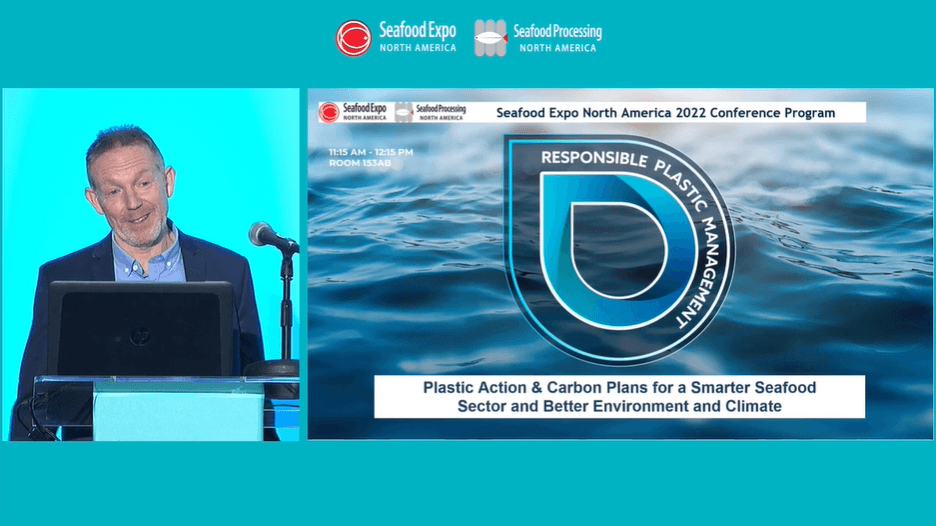
Moderator: Dave Garforth, The Responsible Plastic Management Program CIC
Speakers: Joel Baziuk, Global Ghost Gear Initiative C/o Ocean Conservancy
Peter Marshall, Responsible Plastic Management Program
Plastic is an essential component used extensively throughout the global seafood industry. From nets, floats, pens, boxes, tubs, bags, liners, clothing, PPE, belts, walls, floors, even boats. It assists with catch efficiency, design innovation, durability of infrastructure and equipment, seafood product protection, insulation and prevention of food waste and much more. Unquestionably the most important material we have ever possessed. But few can ignore the negative impact of global plastic mismanagement on the environment and on climate change. Plastic mismanagement after use has caused a pollution crisis and a call on more virgin plastic to be produced. The production and destruction of global plastic accounts for 56 billion tons of greenhouse gas emissions. Plastic management must be integrated into organizations sustainability and carbon reduction action plans and frameworks for better business and a better environment. Plastic is made almost entirely from fossil fuel which means it has a significant carbon footprint. But at the same time, it can offer significant advantages in comparison to other materials and, used correctly and managed responsibly, can offer significant carbon reduction advantages. However, we have sufficient information and tools to make these comparisons and ensure we make better choices. A global shift in the way the industry uses plastic could bring about a substantial contribution to carbon reduction (reducing virgin plastics) and GHG emissions and seafood plastics needs to be included in the equation to reverse climate impact and the loss in nature.
However, we are only just starting to unravel the seafood plastic footprint and adding the extra dimension of mapping the seafood plastic carbon footprint will be a challenging endeavor, particularly if corporates and businesses must go it alone. Key questions arise. What are the full considerations and the extent of this double mapping task? What are the significant contributions to plastic footprints and what are the significant actions that reduce both plastic impacts and carbon emissions…and whilst maintaining viable businesses and importantly, ensure seafood continues to contribute to global food security? What are the policy implications and conflicts (e.g., food packaging legislation versus recycled content), what are the required economies of scale for collection and recycling, what are the infrastructural requirements and what are technology gaps need to be addressed?
This session identifies how this can be achieved. The panel will be managed by the Responsible Plastic Management Program and the speakers are experts in the field of Plastic Management and Sustainability Frameworks. Mapping plastic use, life cycle, end fate and leakage from the global seafood sector is an emerging activity and forming part of the seafood ESG agenda but is a very recent endeavor. What has yet to emerge, are the facts of if, how and to what extent a reduced seafood plastic footprint contributes to a reduced carbon footprint. The Responsible Plastic Management Program is a not-for-profit global assurance and improvement initiative for organizations seeking to engage with a responsible plastic management strategy. The RPM Program is engaged with over 15 industry sectors and works across key plastic driven initiatives.


